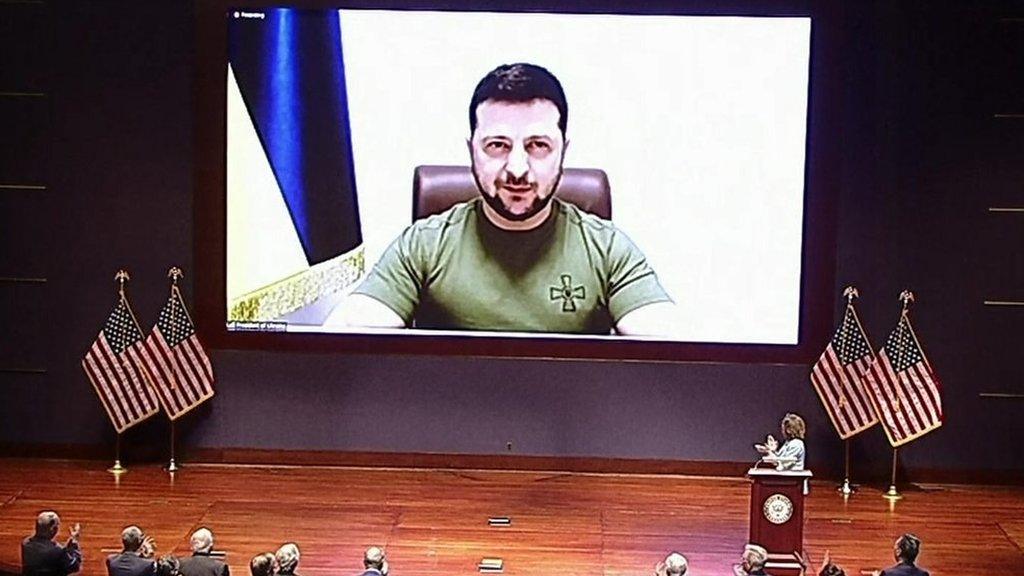Ukraine war: President Zelensky thanks Irish for support
- Published
Ukrainian President Volodymyr Zelensky addresses the Irish parliament
Ukrainian President Volodymyr Zelensky has told Irish politicians that the country had supported Ukraine "since the very first days" of Russia's invasion despite its policy of military neutrality.
Mr Zelensky was addressing a joint sitting of the Oireachtas (Irish houses of parliament).
"You began doing this [supporting Ukraine] right away," he said.
"Thank you for supporting sanctions against Russia.
"Thank you for the humanitarian and financial support extended to our country and thank you for your caring about Ukrainian people who found shelter on your land."
However, Mr Zelensky, whose remote address to Irish parliament members comes six weeks after the invasion began, called for the Irish government to convince EU partners to introduce tougher sanctions against Russia.
The EU is meeting later on Wednesday to discuss further sanctions after allegations of Russian war crimes.
"We have to put an end to trading with Russia," the Ukrainian president said.
"We have to cut ties of the Russian banks to the global system and cut the sources of their income from oil that they use for their weapons and killing."
He also accused Russia of "deliberately provoking a food crisis" in Ukraine by targeting storage depots.
"They are blocking humanitarian access to the half-million people in Mariupol who can no longer melt snow for water.
Taoiseach Micheál Martin addresses the Dáil chamber
"They are bombing 24/7. There is no single house left intact", Mr Zelensky said.
He added that Russian forces had blocked all of Ukraine's sea ports and ships, and were "destroying things that are sustaining livelihoods".
Ukraine is one of the world's biggest producers in agriculture and food and the country's president said Russia's actions would lead to a shortage of food and heightening costs for millions of people across the globe.
"For them hunger is a weapon against us, ordinary people, as an instrument of domination," he added.
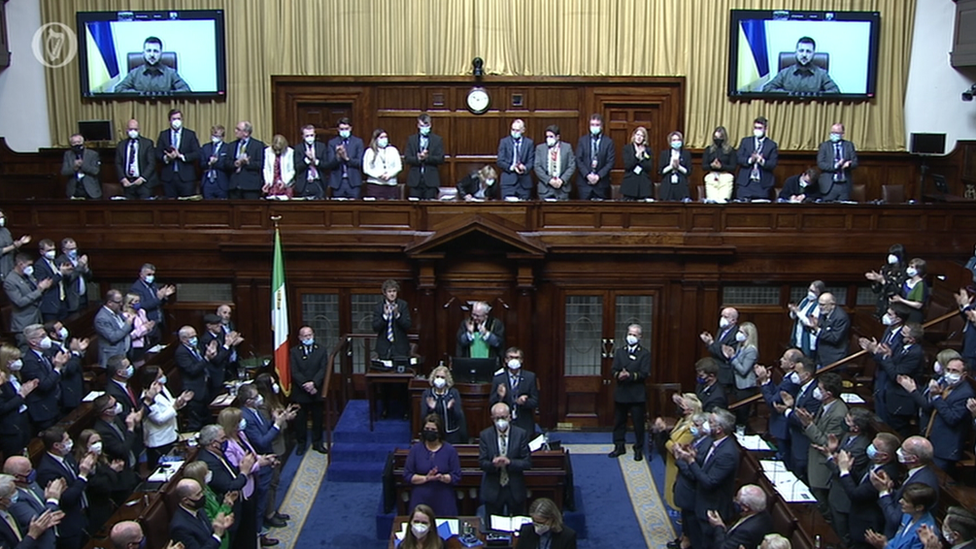
Mr Zelensky was given a standing ovation in the Dáil
He said that at least 167 children have been killed since the war began.
Mr Zelensky told the Oireachtas: "I am sure your leadership can make a difference and change this.
"I'm sure that the whole of Europe can stop this war and bring peace and stability to east of Europe. We can not delay any longer."
The Ukrainian president received a standing ovation after he finished his address.

Analysis: Zelensky struck a chord
by Shane Harrison, Dublin correspondent
President Volodymyr Zelensky has been masterful at keeping his country's plight in the international spotlight and pricking the world's conscience.
He often tailors his message to his audience and in his address to the Irish parliament he mentioned Russian colonialism - perhaps mindful of the Irish experience of British rule.
He didn't labour the point though - again perhaps mindful of British military assistance to his soldiers, especially anti-tank weapons made in Belfast, a two-hour-and-thirty minutes drive from Dublin.
References to Russia using hunger as a weapon of war may also have reminded his audiences of Ireland's Great Famine in the middle of the 19th Century.
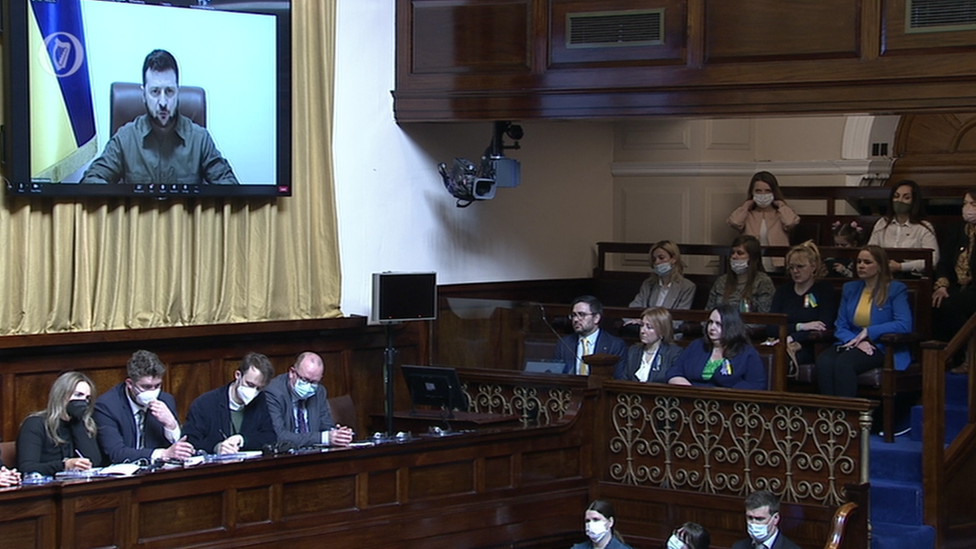
President Zelensky addressed the Oireachtas via video link
He thanked the Irish government and its people for their support for sanctions, for showing humanitarian concern to fleeing refugees, and for supporting Ukraine's efforts to join the European Union as soon as possible.
President Zelensky struck a chord and was given a standing ovation by nearly all present.
Taoiseach (Irish prime minister) Mícheál Martin said Ireland supported Ukraine and could never be neutral when it came to war crimes.
Other politicians made similar points with Mary Lou McDonald, the leader of Sinn Féin, the main opposition party, again calling for the expulsion of the Russian ambassador.
The Ukrainian ambassador, sitting in the Distinguished Visitors' Gallery, clapped enthusiastically when she heard that.
But, in the meantime, despite the international displays of solidarity with President Zelensky and his beleaguered people, the war in Ukraine and the killings continue.

What is Ireland's neutrality policy?
The policy has a long history, with the state remaining neutral during World War Two.
The origins of this comes partly from the centuries-old Irish conflict with British imperialism and partly from the moral view that wars are wrong.
Ireland made it clear it could not join the North Atlantic Treaty Organisation (Nato) after World War Two because of partition - Northern Ireland remains part of the UK.
Irish soldiers do frequently serve in UN peacekeeping and peace-enforcement missions.
The conflict in Ukraine has brought the policy under renewed scrutiny.
However, while the state is militarily neutral, it was never politically neutral - and political leaders have made it clear that it is not neutral on Ukraine.

- Published23 March 2022
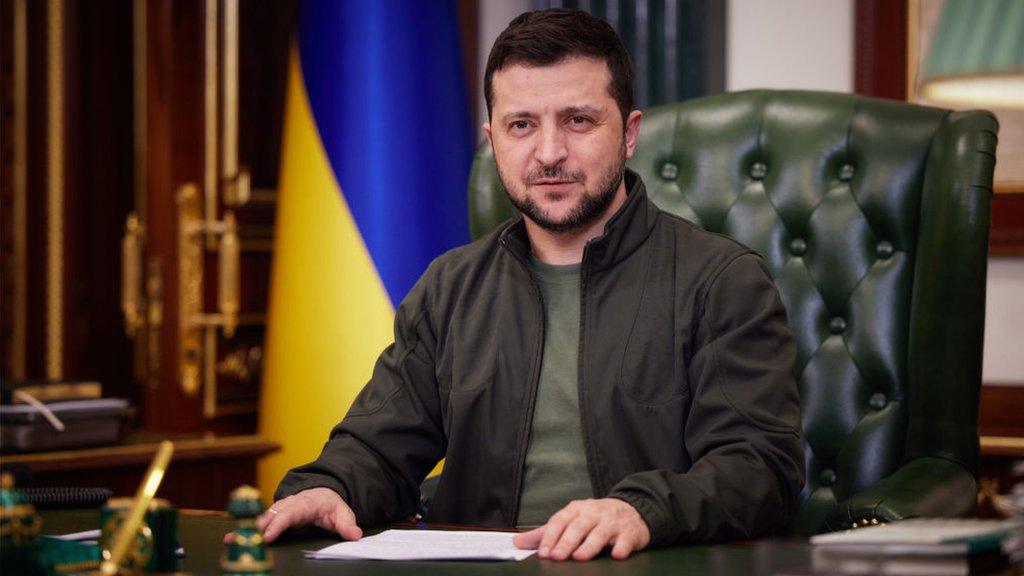
- Published8 March 2022
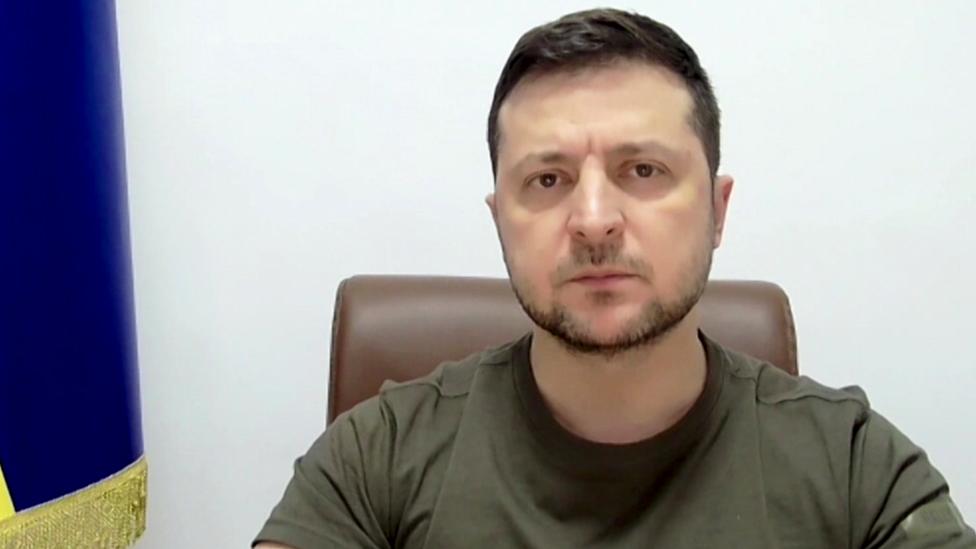
- Published16 March 2022
